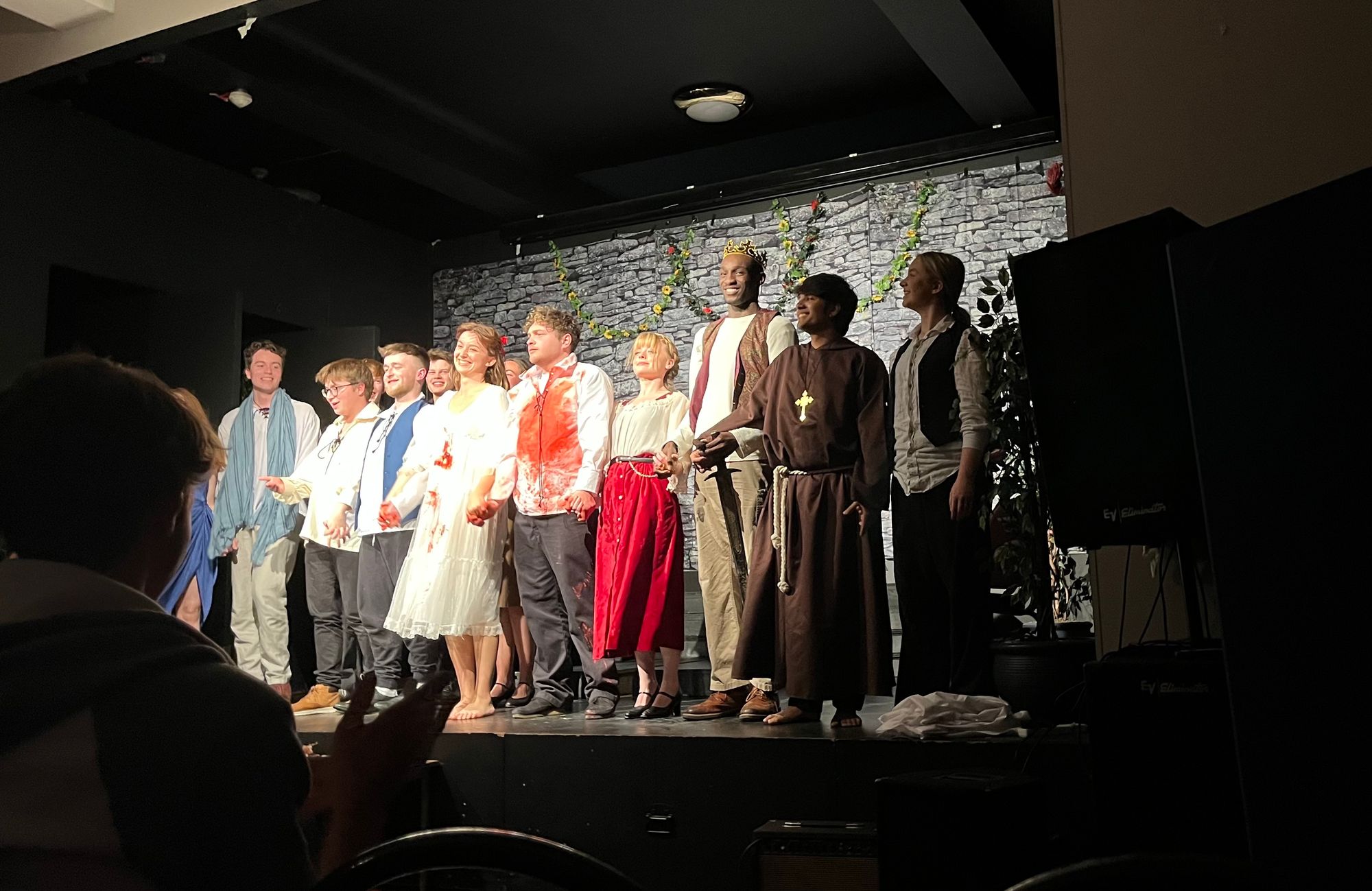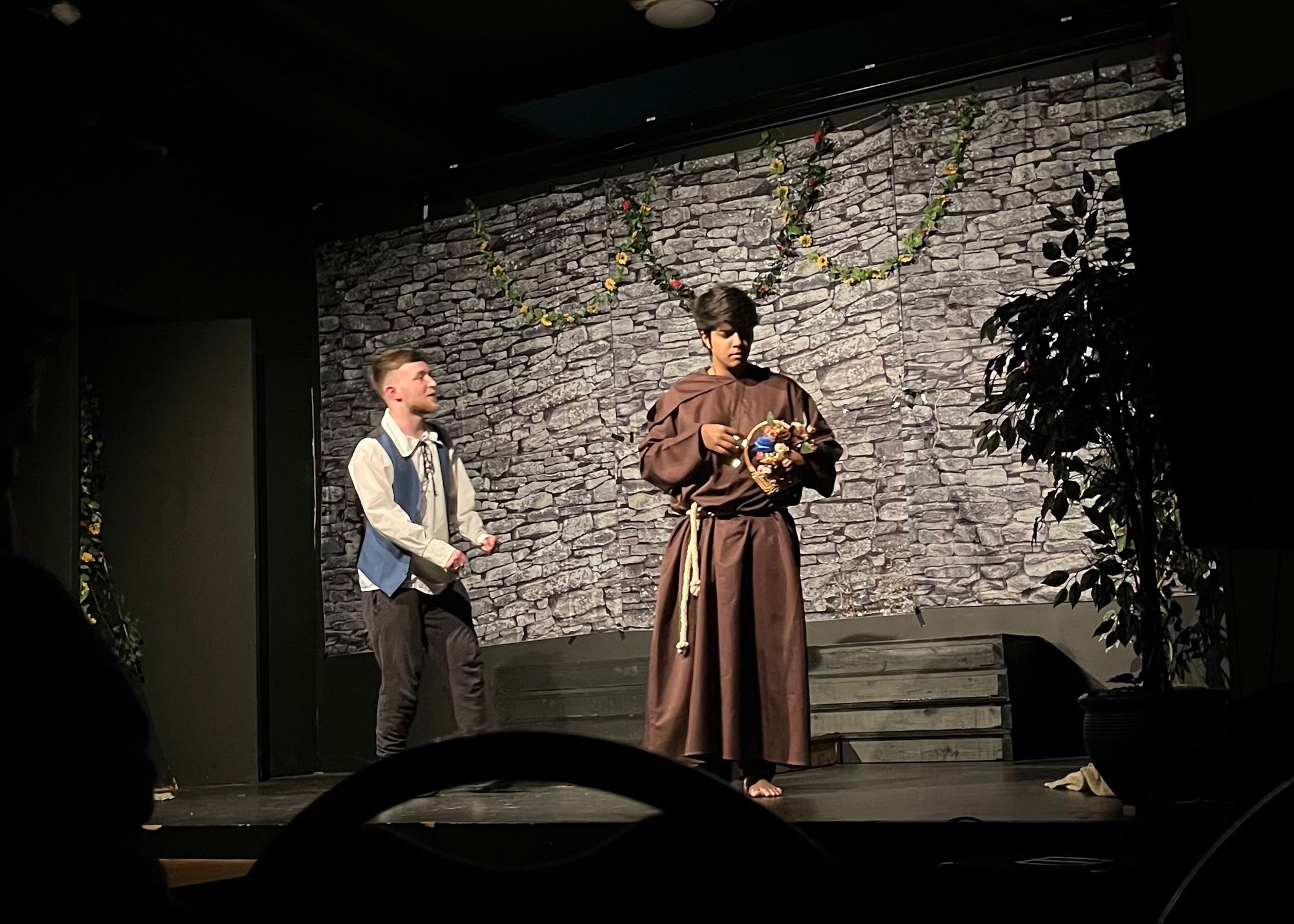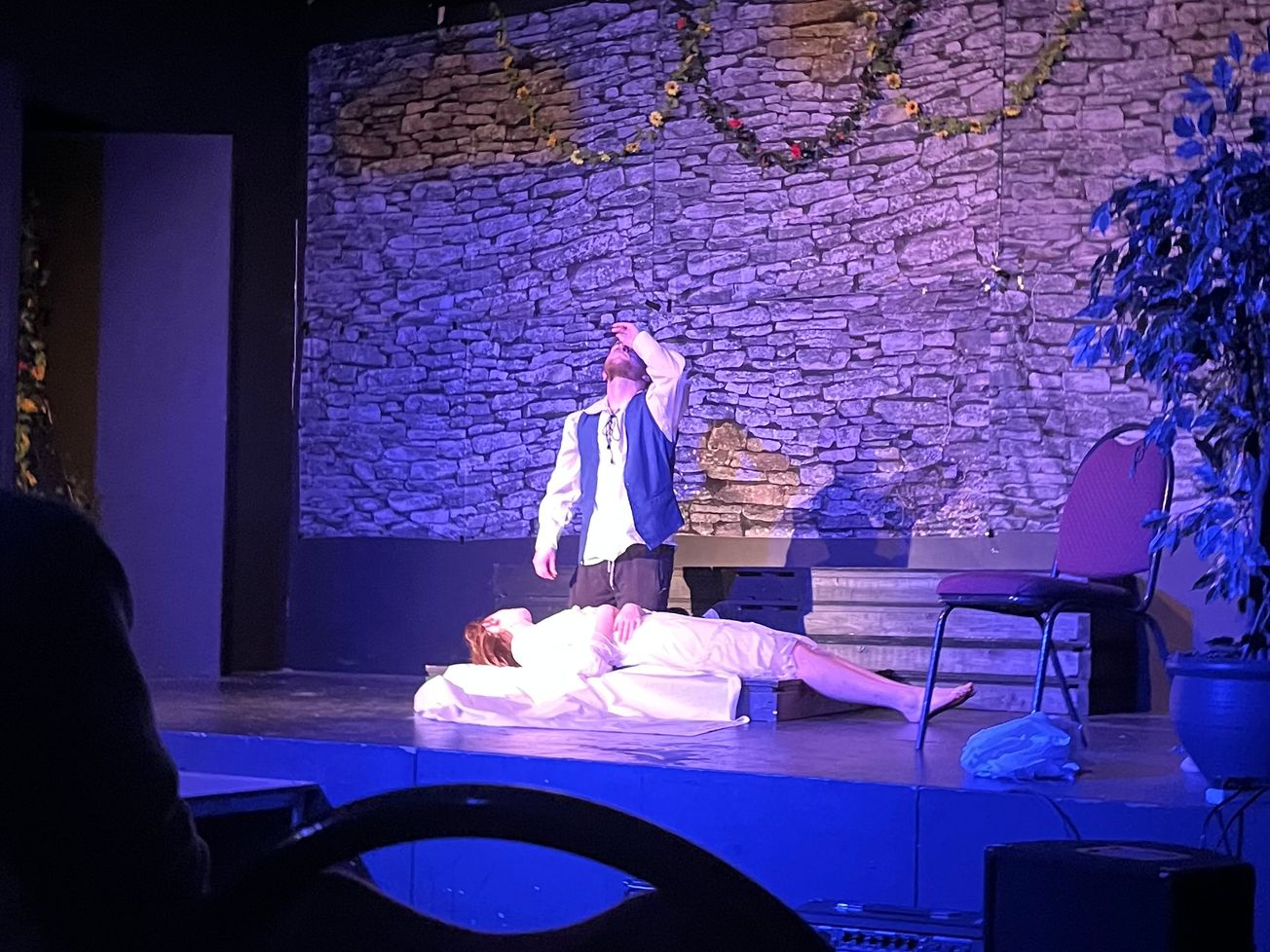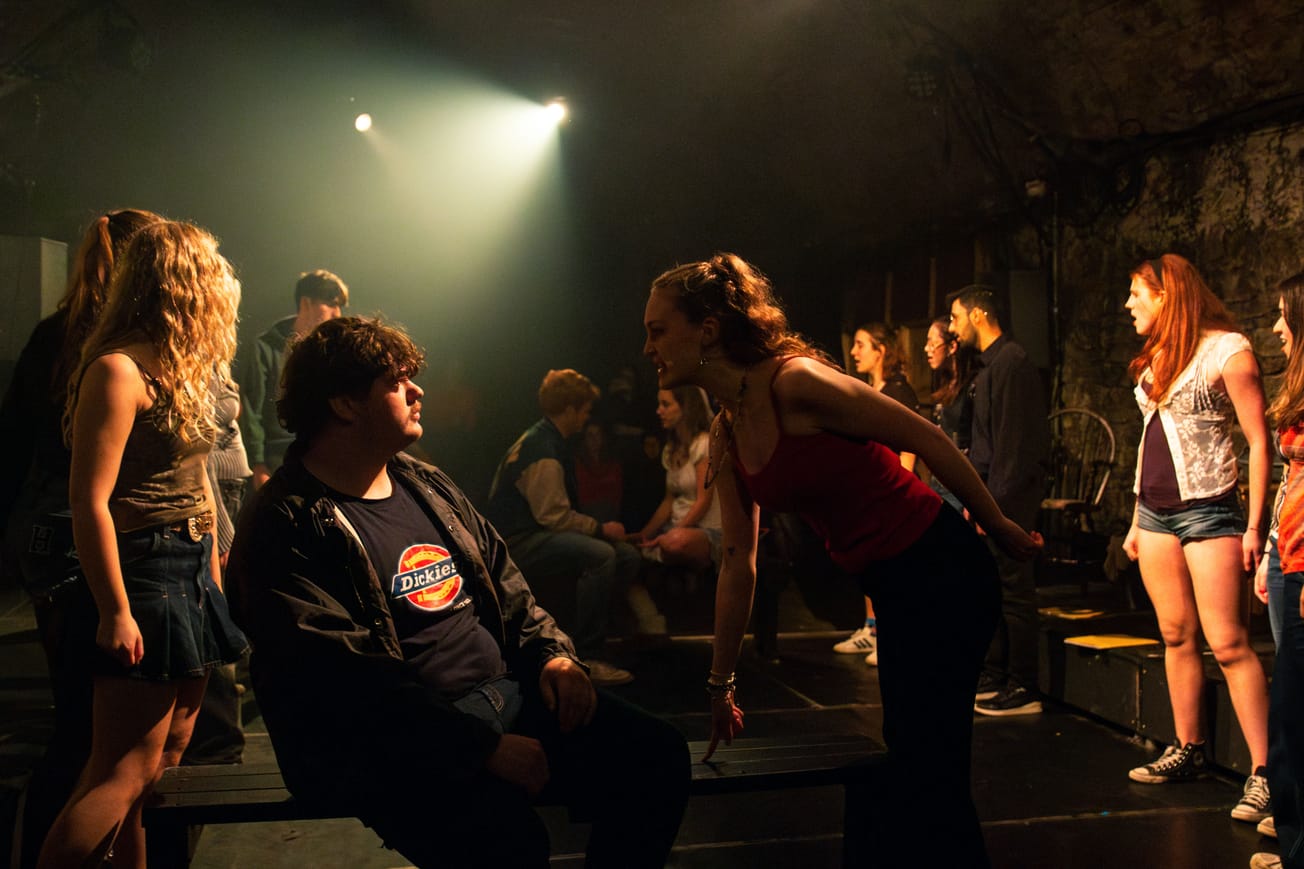By Evelyn Heis, Film & Television Co-Deputy Editor
William Shakespeare’s Romeo and Juliet is one of the most renowned plays to have ever graced the stage. Telling the classic story of boy meets girl, a feud between two powerful families, a whirlwind, four-day romance, and a great deal of bloodshed. The ‘forbidden romance’ trope has become the blueprint for many other dramatisations, including West Side Story (1961) and Baz Luhrmann’s Romeo + Juliet (1996), so it was intriguing to see how Bristol’s Shakespeare Society would approach a play with a myriad of adaptations, in their debut as a society last weekend.
The Bristol Shakespeare Society is a newly found society, aiming to make Shakespeare’s plays more accessible, digestible, and entertaining for those who may not have encountered his work before. Their rendition of Romeo and Juliet not only introduced them as a society, but also brought Shakespeare to the forefront of University Drama, with this play being the first Shakespeare play to have been put on at Bristol University in the last three years.
Taking place in Clifton Hill House, it seemed like an unusual setting to watch a drama unfold, though ultimately, this spacious hall with multiple hidden entrance and exit spots worked well for this performance. The play commenced with the conflict between the Montague and Capulet men, who cleverly utilised the open floor space by running from the stage to the back of the room and stage again, adding different levels and dimension to the thumb-biting quarrel. The audience was fully immersed in the action, having to swivel in their chair to witness the duels that were taking place behind them and in the aisles. Though a little uncomfortable and tiring, at times, it did keep the audience engaged and, quite literally, at the edge of their seats.

In addition to their innovative use of space and staging, the cast included accents of colour in their costumes, with a red ribbon for Juliet, a Capulet, and a blue waist coat for Romeo, a Montague. The rest of the cast was also dressed accordingly in their colours, utilising scarves, dresses, and arm bands to signal their oppositional houses. This great attention to detail served as a clever and visual reminder of what character belongs where, particularly for those unfamiliar with Shakespeare, and this attentiveness in costume was matched with the lighting also. Warm lighting was used to signal the sunrise, while the cold light captured the moonlit balcony scene perfectly. Towards the end of the play, the use of blue lighting came to represent Romeo and his melancholy.
Most scenes were accompanied with soundtracks, such as ‘Howl’s Moving Castle Theme’ playing at the Capulet’s party and Friar Lawrence’s entrance marked by Lord Of The Rings’ ‘The Shire’ Theme. Other times, short sound clips were also included, such as an up-beat, circus-like song during Tybalt and Romeo’s brawl. The incongruence between the Elizabethan play and the contemporary music created an uncomfortable comical effect- it was unclear whether moments like these were intended to be funny or not. Though, Freddie Tuxworth, who played the guitar during the intermission is deserving of an honourable mention for his live entertainment.
Shakespeare Soc definitely put their own twist on Shakespeare’s Romeo and Juliet, taking a slightly unconventional and original approach in choosing to focus on the gore and violence that permeates Verona, as opposed to the love story that ‘almost tells itself’, commented Jess Millson who played Juliet. Director, Tim Lavy, and producers Jess Millson and Manas Ganguly, wanted the violence to be a ‘prominent part of the play so that people felt the tension that the characters feel themselves: Should I feel bad for Romeo? Why am I crying at his death when he just accidentally got his best friend killed and murdered Juliet’s cousin?’

The violence and the gore of the play felt, at times, slightly excessive and overly exaggerated. There was too much testosterone in one room, as the male characters launched themselves on the stage and wrestled in the aisle, smearing blood, and throwing punches in every other scene. Many of the lines were also screamed throughout, instead of powerfully delivered, creating an uncomfortable performance I struggled to connect with- particularly, following Juliet’s disagreement with her father where she is slapped.
That being said, their dedication and innovative approach to bring Shakespeare to the stage is something that has to be commended. The boys, playing Romeo, Tybalt, Mercutio, and more, received combat training to prepare for the fighting scenes, and the directorial decision to focus on the conflict was also a contributing factor I wish I’d known beforehand. Though, I appreciate Shakespeare Soc’s creative approach as it was achieved.
All of the actors were extremely committed to their roles, their passion for Shakespeare and doing their characters justice was not something that faltered. Natty Croucher, who played Romeo, captured the multifaceted essence of his character really well, stating that he had to ‘get into deep character for the individual stages of Romeo’ in order to portray his character’s internal turmoil, going from an ‘innocent, melancholic, child-like lover to a cold-blooded murderer.’
Review: ‘Days @ Dear Old Brizz’ by Music Theatre Bristol @ Alma Tavern Theatre
Preview: Wall(s) by DramSoc @ Tobacco Factory Theatre
Juliet, played by Jessica Millson, gave an equally convincing performance, playing her as a typically weepy teenage girl, though, adding her own twist to the role: ‘I wanted her to be slightly more modern because she does have a lot of power in the play. She’s the one who proposes, she is deliberately given a lot of lines and she’s the one who organises a lot of the events that happen, unfortunately, that goes badly for her, but I wanted to make sure that she had some autonomy.’
Mercutio, played by Albie Marber and Benvolio, played by Rory Stroud, gave the play the light-heartedness and humour it needed following the conflict, and all together, the ‘lads’, Mercutio, Romeo and Benvolio, provided a lot of comical relief. The Friar, played by Manas Ganguly, and Nurse, played by Aoibh McCann gave exceptional performances as Romeo and Juliet’s voices of reason.
All in all, Shakespeare Soc’s Romeo and Juliet was a promising start for the society, with this performance marking many firsts for everyone: the first directorial project for Tim Lavy, the first performance back for many of the actors, and a first for the society as a whole. Rumour has it that they’re aiming to put on two performances a year, a Drama and a Comedy, so keep your eyes peeled for further performances from the Shakespeare Society this year.
Featured Image: Evelyn Heis / Epigram









